Importance of Activity Based Costing in Cost Management and Pricing Decisions
VerifiedAdded on 2023/06/04
|12
|2848
|398
AI Summary
The report analyzes the importance of activity based costing in cost management and pricing decisions by evaluating two research papers from the Journal of Management Accounting. The report explains the concept of activity based costing, the findings of the two research papers, similarities and differences between the findings, and the usefulness of the findings for management accounting professionals. The report concludes that activity based costing is an important development in the management accounting field and tends to benefit the organization by making an improvement in their costing system.
Contribute Materials
Your contribution can guide someone’s learning journey. Share your
documents today.
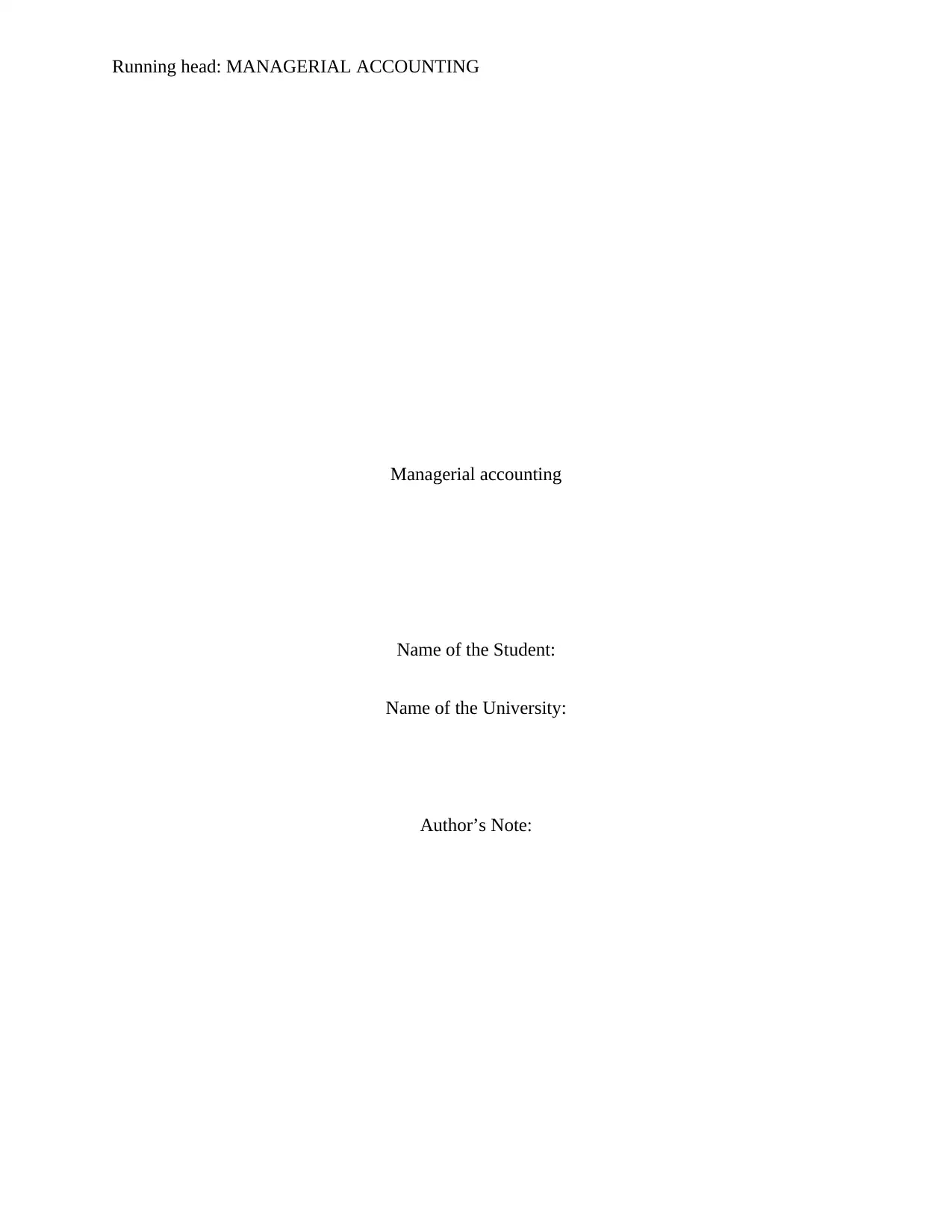
Running head: MANAGERIAL ACCOUNTING
Managerial accounting
Name of the Student:
Name of the University:
Author’s Note:
Managerial accounting
Name of the Student:
Name of the University:
Author’s Note:
Secure Best Marks with AI Grader
Need help grading? Try our AI Grader for instant feedback on your assignments.
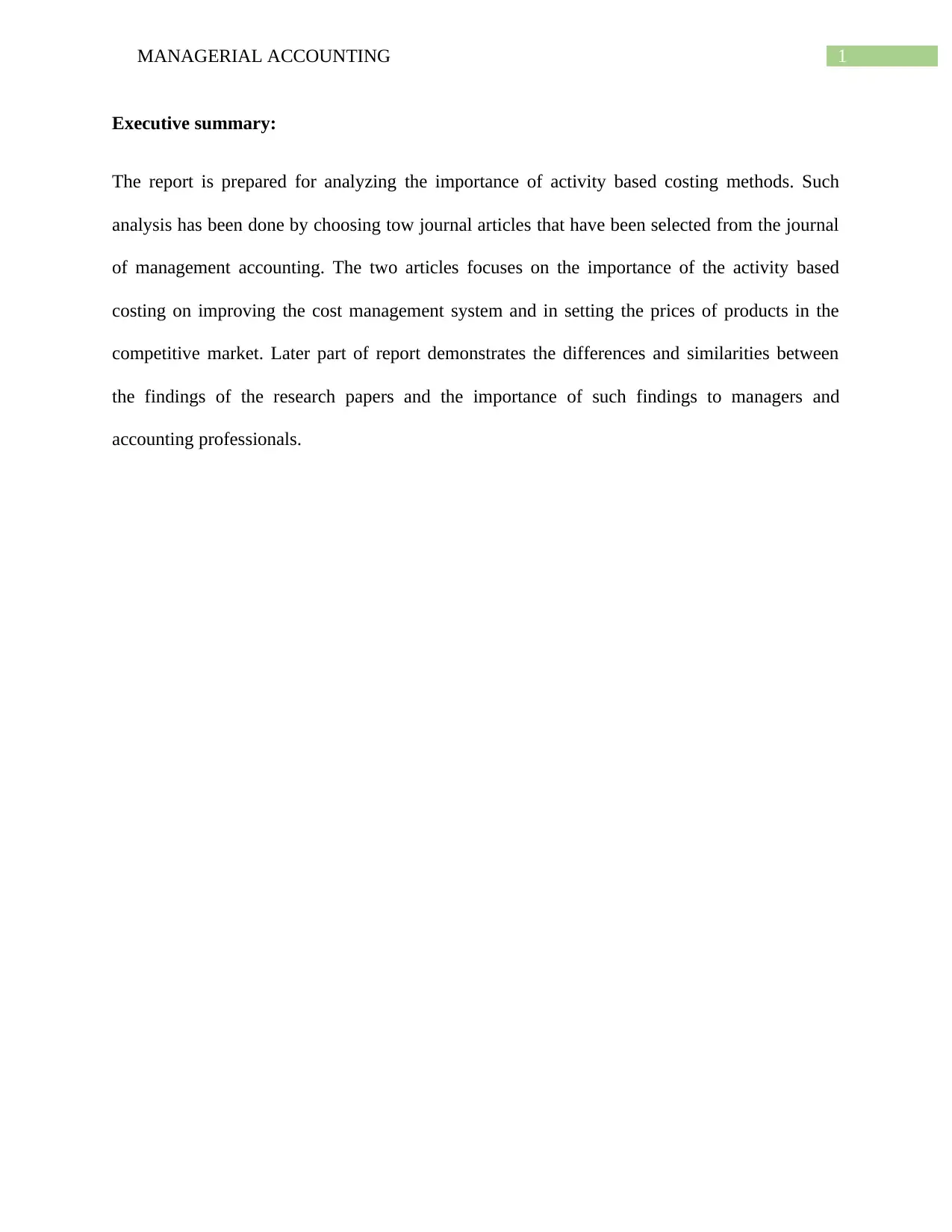
1MANAGERIAL ACCOUNTING
Executive summary:
The report is prepared for analyzing the importance of activity based costing methods. Such
analysis has been done by choosing tow journal articles that have been selected from the journal
of management accounting. The two articles focuses on the importance of the activity based
costing on improving the cost management system and in setting the prices of products in the
competitive market. Later part of report demonstrates the differences and similarities between
the findings of the research papers and the importance of such findings to managers and
accounting professionals.
Executive summary:
The report is prepared for analyzing the importance of activity based costing methods. Such
analysis has been done by choosing tow journal articles that have been selected from the journal
of management accounting. The two articles focuses on the importance of the activity based
costing on improving the cost management system and in setting the prices of products in the
competitive market. Later part of report demonstrates the differences and similarities between
the findings of the research papers and the importance of such findings to managers and
accounting professionals.
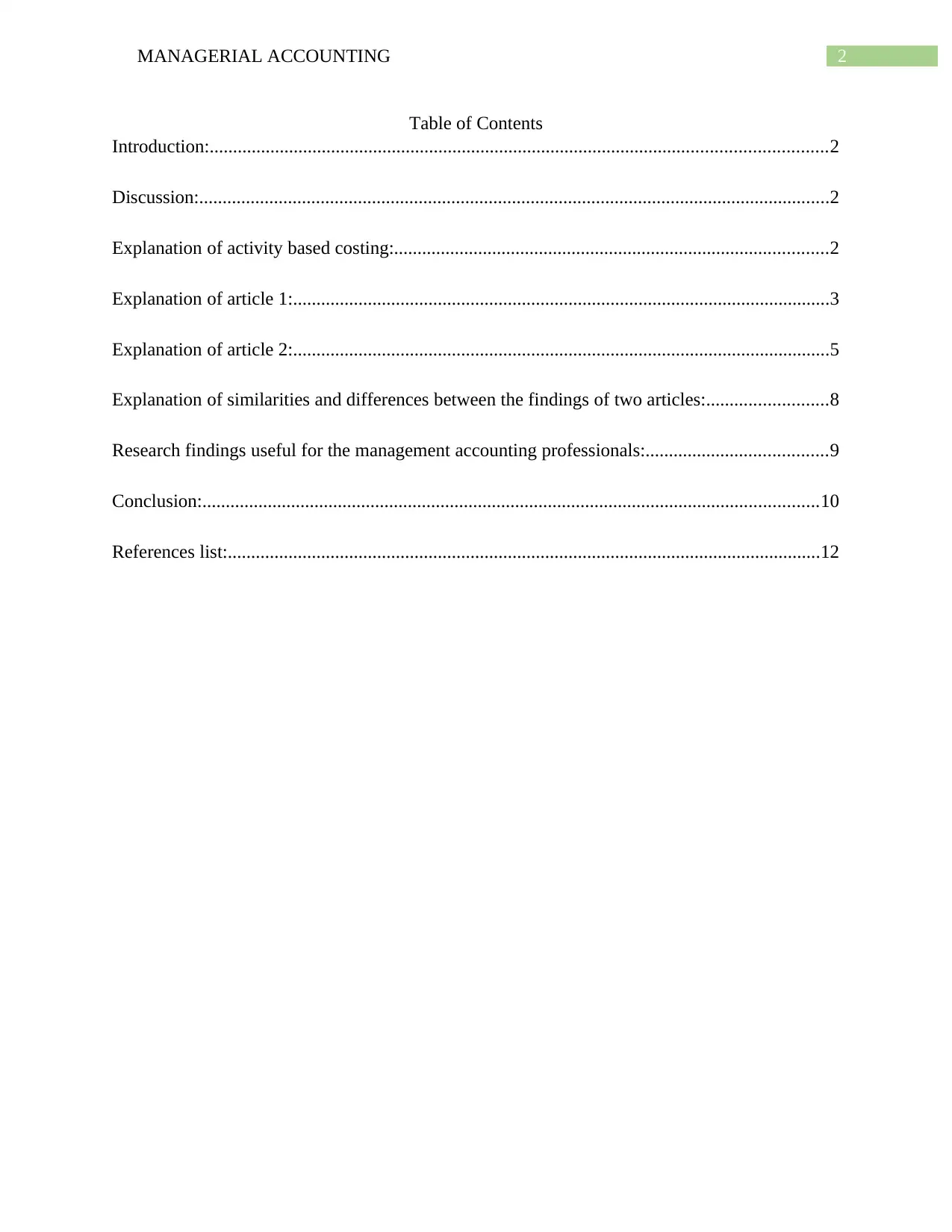
2MANAGERIAL ACCOUNTING
Table of Contents
Introduction:....................................................................................................................................2
Discussion:.......................................................................................................................................2
Explanation of activity based costing:.............................................................................................2
Explanation of article 1:...................................................................................................................3
Explanation of article 2:...................................................................................................................5
Explanation of similarities and differences between the findings of two articles:..........................8
Research findings useful for the management accounting professionals:.......................................9
Conclusion:....................................................................................................................................10
References list:...............................................................................................................................12
Table of Contents
Introduction:....................................................................................................................................2
Discussion:.......................................................................................................................................2
Explanation of activity based costing:.............................................................................................2
Explanation of article 1:...................................................................................................................3
Explanation of article 2:...................................................................................................................5
Explanation of similarities and differences between the findings of two articles:..........................8
Research findings useful for the management accounting professionals:.......................................9
Conclusion:....................................................................................................................................10
References list:...............................................................................................................................12
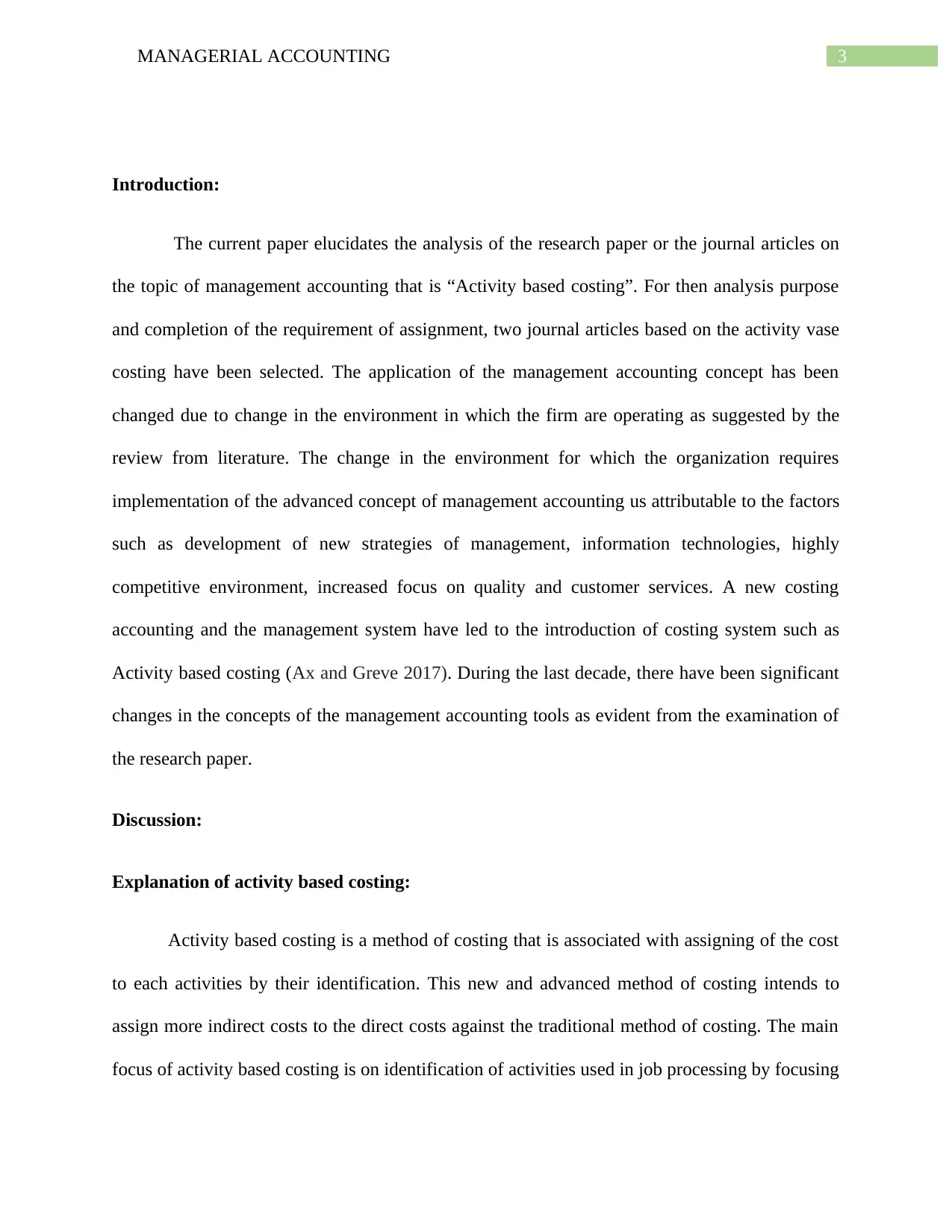
3MANAGERIAL ACCOUNTING
Introduction:
The current paper elucidates the analysis of the research paper or the journal articles on
the topic of management accounting that is “Activity based costing”. For then analysis purpose
and completion of the requirement of assignment, two journal articles based on the activity vase
costing have been selected. The application of the management accounting concept has been
changed due to change in the environment in which the firm are operating as suggested by the
review from literature. The change in the environment for which the organization requires
implementation of the advanced concept of management accounting us attributable to the factors
such as development of new strategies of management, information technologies, highly
competitive environment, increased focus on quality and customer services. A new costing
accounting and the management system have led to the introduction of costing system such as
Activity based costing (Ax and Greve 2017). During the last decade, there have been significant
changes in the concepts of the management accounting tools as evident from the examination of
the research paper.
Discussion:
Explanation of activity based costing:
Activity based costing is a method of costing that is associated with assigning of the cost
to each activities by their identification. This new and advanced method of costing intends to
assign more indirect costs to the direct costs against the traditional method of costing. The main
focus of activity based costing is on identification of activities used in job processing by focusing
Introduction:
The current paper elucidates the analysis of the research paper or the journal articles on
the topic of management accounting that is “Activity based costing”. For then analysis purpose
and completion of the requirement of assignment, two journal articles based on the activity vase
costing have been selected. The application of the management accounting concept has been
changed due to change in the environment in which the firm are operating as suggested by the
review from literature. The change in the environment for which the organization requires
implementation of the advanced concept of management accounting us attributable to the factors
such as development of new strategies of management, information technologies, highly
competitive environment, increased focus on quality and customer services. A new costing
accounting and the management system have led to the introduction of costing system such as
Activity based costing (Ax and Greve 2017). During the last decade, there have been significant
changes in the concepts of the management accounting tools as evident from the examination of
the research paper.
Discussion:
Explanation of activity based costing:
Activity based costing is a method of costing that is associated with assigning of the cost
to each activities by their identification. This new and advanced method of costing intends to
assign more indirect costs to the direct costs against the traditional method of costing. The main
focus of activity based costing is on identification of activities used in job processing by focusing
Secure Best Marks with AI Grader
Need help grading? Try our AI Grader for instant feedback on your assignments.
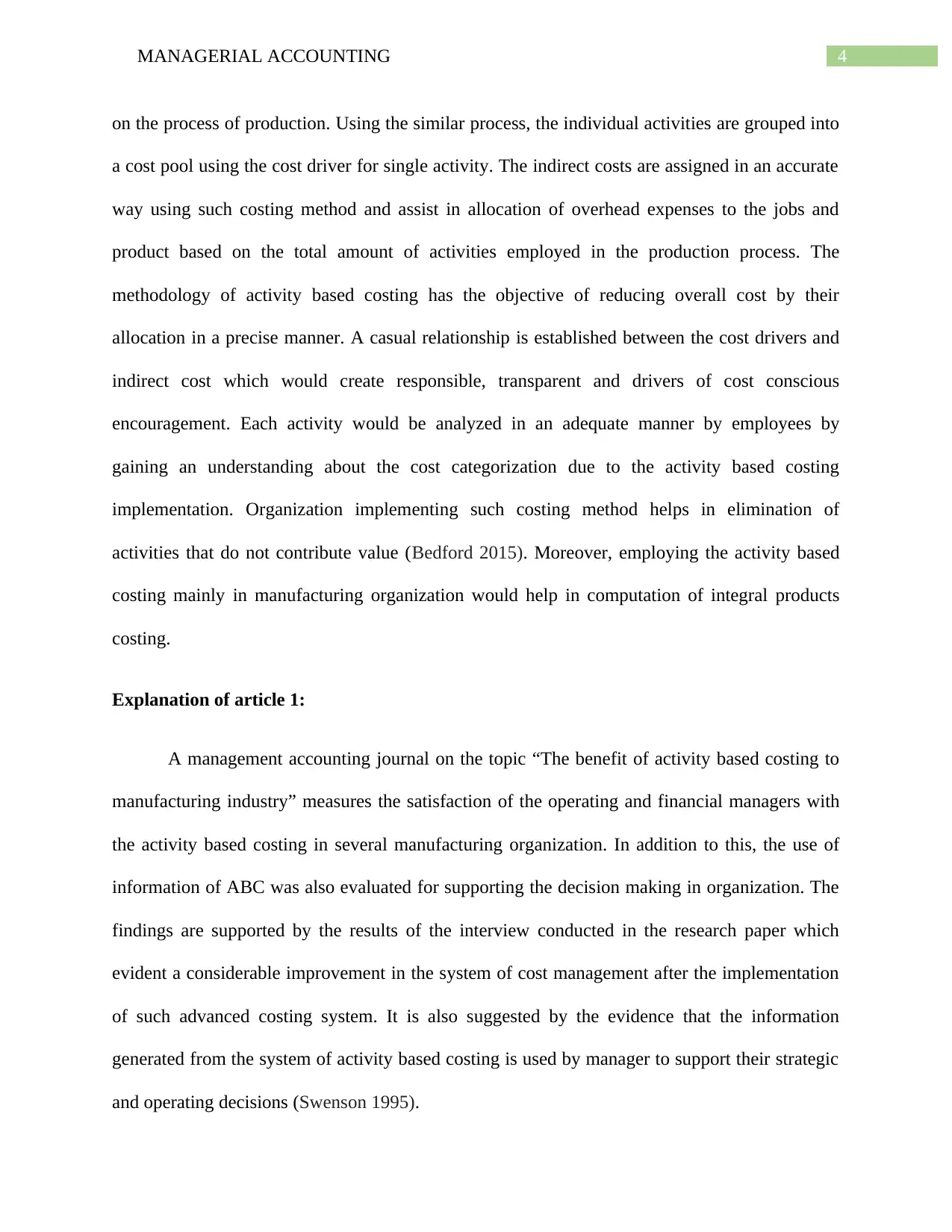
4MANAGERIAL ACCOUNTING
on the process of production. Using the similar process, the individual activities are grouped into
a cost pool using the cost driver for single activity. The indirect costs are assigned in an accurate
way using such costing method and assist in allocation of overhead expenses to the jobs and
product based on the total amount of activities employed in the production process. The
methodology of activity based costing has the objective of reducing overall cost by their
allocation in a precise manner. A casual relationship is established between the cost drivers and
indirect cost which would create responsible, transparent and drivers of cost conscious
encouragement. Each activity would be analyzed in an adequate manner by employees by
gaining an understanding about the cost categorization due to the activity based costing
implementation. Organization implementing such costing method helps in elimination of
activities that do not contribute value (Bedford 2015). Moreover, employing the activity based
costing mainly in manufacturing organization would help in computation of integral products
costing.
Explanation of article 1:
A management accounting journal on the topic “The benefit of activity based costing to
manufacturing industry” measures the satisfaction of the operating and financial managers with
the activity based costing in several manufacturing organization. In addition to this, the use of
information of ABC was also evaluated for supporting the decision making in organization. The
findings are supported by the results of the interview conducted in the research paper which
evident a considerable improvement in the system of cost management after the implementation
of such advanced costing system. It is also suggested by the evidence that the information
generated from the system of activity based costing is used by manager to support their strategic
and operating decisions (Swenson 1995).
on the process of production. Using the similar process, the individual activities are grouped into
a cost pool using the cost driver for single activity. The indirect costs are assigned in an accurate
way using such costing method and assist in allocation of overhead expenses to the jobs and
product based on the total amount of activities employed in the production process. The
methodology of activity based costing has the objective of reducing overall cost by their
allocation in a precise manner. A casual relationship is established between the cost drivers and
indirect cost which would create responsible, transparent and drivers of cost conscious
encouragement. Each activity would be analyzed in an adequate manner by employees by
gaining an understanding about the cost categorization due to the activity based costing
implementation. Organization implementing such costing method helps in elimination of
activities that do not contribute value (Bedford 2015). Moreover, employing the activity based
costing mainly in manufacturing organization would help in computation of integral products
costing.
Explanation of article 1:
A management accounting journal on the topic “The benefit of activity based costing to
manufacturing industry” measures the satisfaction of the operating and financial managers with
the activity based costing in several manufacturing organization. In addition to this, the use of
information of ABC was also evaluated for supporting the decision making in organization. The
findings are supported by the results of the interview conducted in the research paper which
evident a considerable improvement in the system of cost management after the implementation
of such advanced costing system. It is also suggested by the evidence that the information
generated from the system of activity based costing is used by manager to support their strategic
and operating decisions (Swenson 1995).
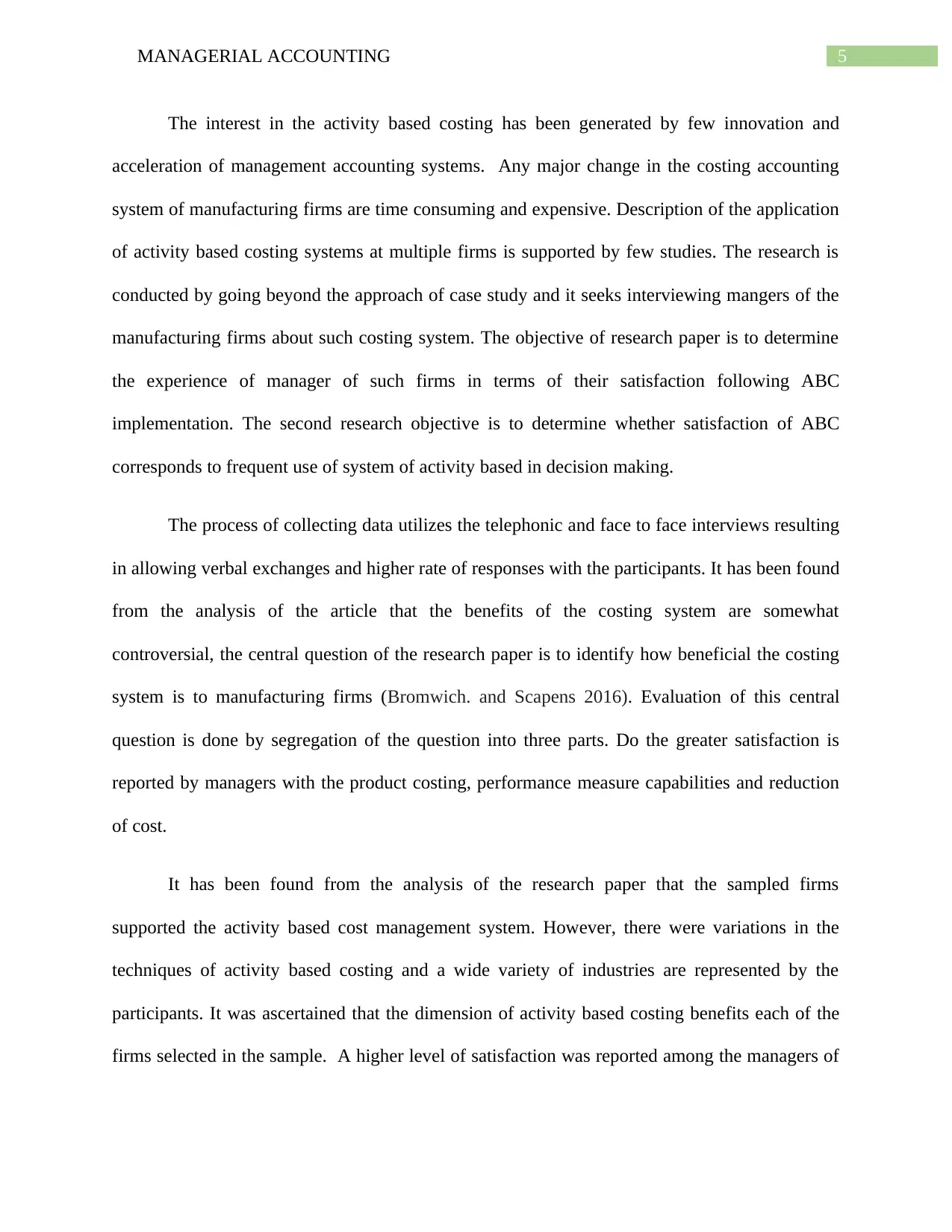
5MANAGERIAL ACCOUNTING
The interest in the activity based costing has been generated by few innovation and
acceleration of management accounting systems. Any major change in the costing accounting
system of manufacturing firms are time consuming and expensive. Description of the application
of activity based costing systems at multiple firms is supported by few studies. The research is
conducted by going beyond the approach of case study and it seeks interviewing mangers of the
manufacturing firms about such costing system. The objective of research paper is to determine
the experience of manager of such firms in terms of their satisfaction following ABC
implementation. The second research objective is to determine whether satisfaction of ABC
corresponds to frequent use of system of activity based in decision making.
The process of collecting data utilizes the telephonic and face to face interviews resulting
in allowing verbal exchanges and higher rate of responses with the participants. It has been found
from the analysis of the article that the benefits of the costing system are somewhat
controversial, the central question of the research paper is to identify how beneficial the costing
system is to manufacturing firms (Bromwich. and Scapens 2016). Evaluation of this central
question is done by segregation of the question into three parts. Do the greater satisfaction is
reported by managers with the product costing, performance measure capabilities and reduction
of cost.
It has been found from the analysis of the research paper that the sampled firms
supported the activity based cost management system. However, there were variations in the
techniques of activity based costing and a wide variety of industries are represented by the
participants. It was ascertained that the dimension of activity based costing benefits each of the
firms selected in the sample. A higher level of satisfaction was reported among the managers of
The interest in the activity based costing has been generated by few innovation and
acceleration of management accounting systems. Any major change in the costing accounting
system of manufacturing firms are time consuming and expensive. Description of the application
of activity based costing systems at multiple firms is supported by few studies. The research is
conducted by going beyond the approach of case study and it seeks interviewing mangers of the
manufacturing firms about such costing system. The objective of research paper is to determine
the experience of manager of such firms in terms of their satisfaction following ABC
implementation. The second research objective is to determine whether satisfaction of ABC
corresponds to frequent use of system of activity based in decision making.
The process of collecting data utilizes the telephonic and face to face interviews resulting
in allowing verbal exchanges and higher rate of responses with the participants. It has been found
from the analysis of the article that the benefits of the costing system are somewhat
controversial, the central question of the research paper is to identify how beneficial the costing
system is to manufacturing firms (Bromwich. and Scapens 2016). Evaluation of this central
question is done by segregation of the question into three parts. Do the greater satisfaction is
reported by managers with the product costing, performance measure capabilities and reduction
of cost.
It has been found from the analysis of the research paper that the sampled firms
supported the activity based cost management system. However, there were variations in the
techniques of activity based costing and a wide variety of industries are represented by the
participants. It was ascertained that the dimension of activity based costing benefits each of the
firms selected in the sample. A higher level of satisfaction was reported among the managers of
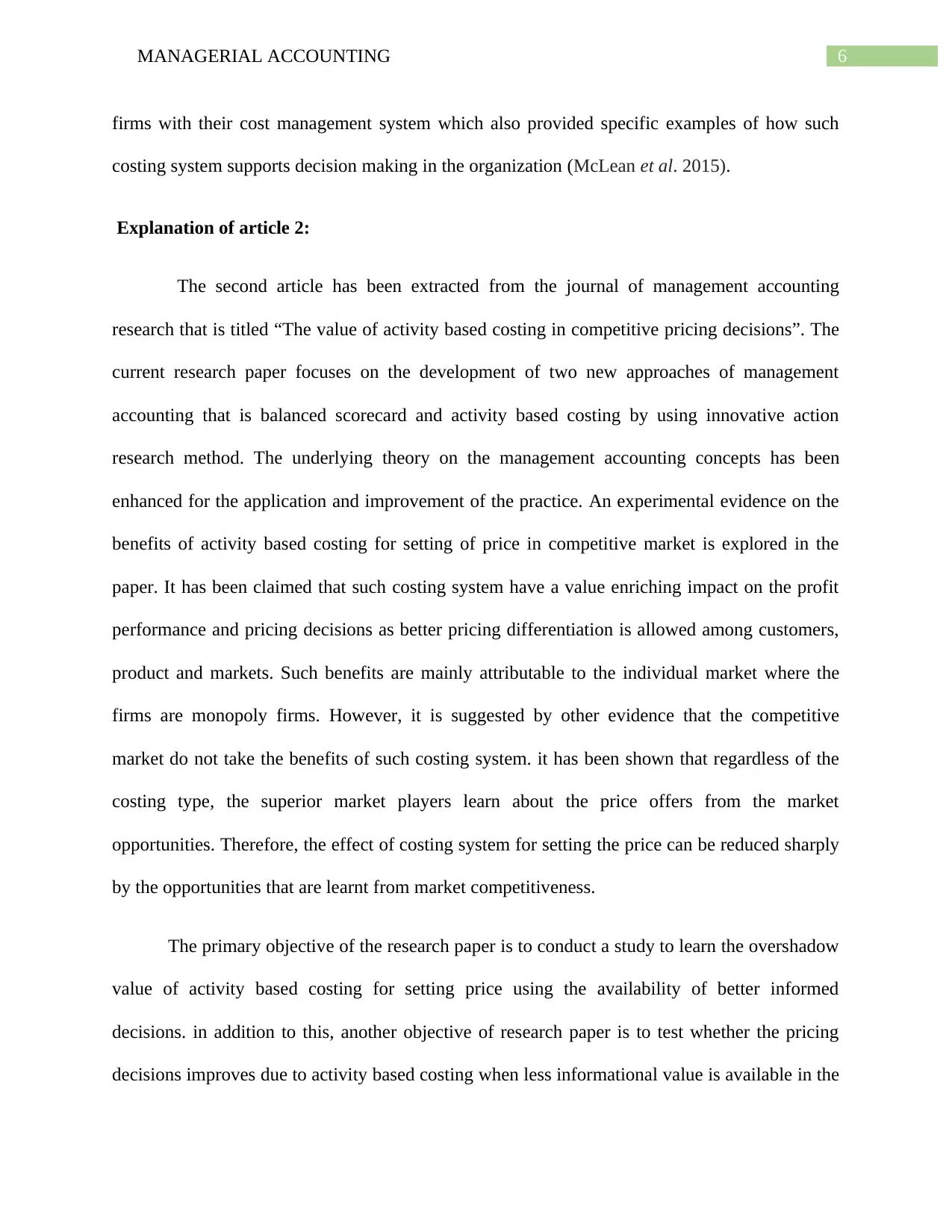
6MANAGERIAL ACCOUNTING
firms with their cost management system which also provided specific examples of how such
costing system supports decision making in the organization (McLean et al. 2015).
Explanation of article 2:
The second article has been extracted from the journal of management accounting
research that is titled “The value of activity based costing in competitive pricing decisions”. The
current research paper focuses on the development of two new approaches of management
accounting that is balanced scorecard and activity based costing by using innovative action
research method. The underlying theory on the management accounting concepts has been
enhanced for the application and improvement of the practice. An experimental evidence on the
benefits of activity based costing for setting of price in competitive market is explored in the
paper. It has been claimed that such costing system have a value enriching impact on the profit
performance and pricing decisions as better pricing differentiation is allowed among customers,
product and markets. Such benefits are mainly attributable to the individual market where the
firms are monopoly firms. However, it is suggested by other evidence that the competitive
market do not take the benefits of such costing system. it has been shown that regardless of the
costing type, the superior market players learn about the price offers from the market
opportunities. Therefore, the effect of costing system for setting the price can be reduced sharply
by the opportunities that are learnt from market competitiveness.
The primary objective of the research paper is to conduct a study to learn the overshadow
value of activity based costing for setting price using the availability of better informed
decisions. in addition to this, another objective of research paper is to test whether the pricing
decisions improves due to activity based costing when less informational value is available in the
firms with their cost management system which also provided specific examples of how such
costing system supports decision making in the organization (McLean et al. 2015).
Explanation of article 2:
The second article has been extracted from the journal of management accounting
research that is titled “The value of activity based costing in competitive pricing decisions”. The
current research paper focuses on the development of two new approaches of management
accounting that is balanced scorecard and activity based costing by using innovative action
research method. The underlying theory on the management accounting concepts has been
enhanced for the application and improvement of the practice. An experimental evidence on the
benefits of activity based costing for setting of price in competitive market is explored in the
paper. It has been claimed that such costing system have a value enriching impact on the profit
performance and pricing decisions as better pricing differentiation is allowed among customers,
product and markets. Such benefits are mainly attributable to the individual market where the
firms are monopoly firms. However, it is suggested by other evidence that the competitive
market do not take the benefits of such costing system. it has been shown that regardless of the
costing type, the superior market players learn about the price offers from the market
opportunities. Therefore, the effect of costing system for setting the price can be reduced sharply
by the opportunities that are learnt from market competitiveness.
The primary objective of the research paper is to conduct a study to learn the overshadow
value of activity based costing for setting price using the availability of better informed
decisions. in addition to this, another objective of research paper is to test whether the pricing
decisions improves due to activity based costing when less informational value is available in the
Paraphrase This Document
Need a fresh take? Get an instant paraphrase of this document with our AI Paraphraser
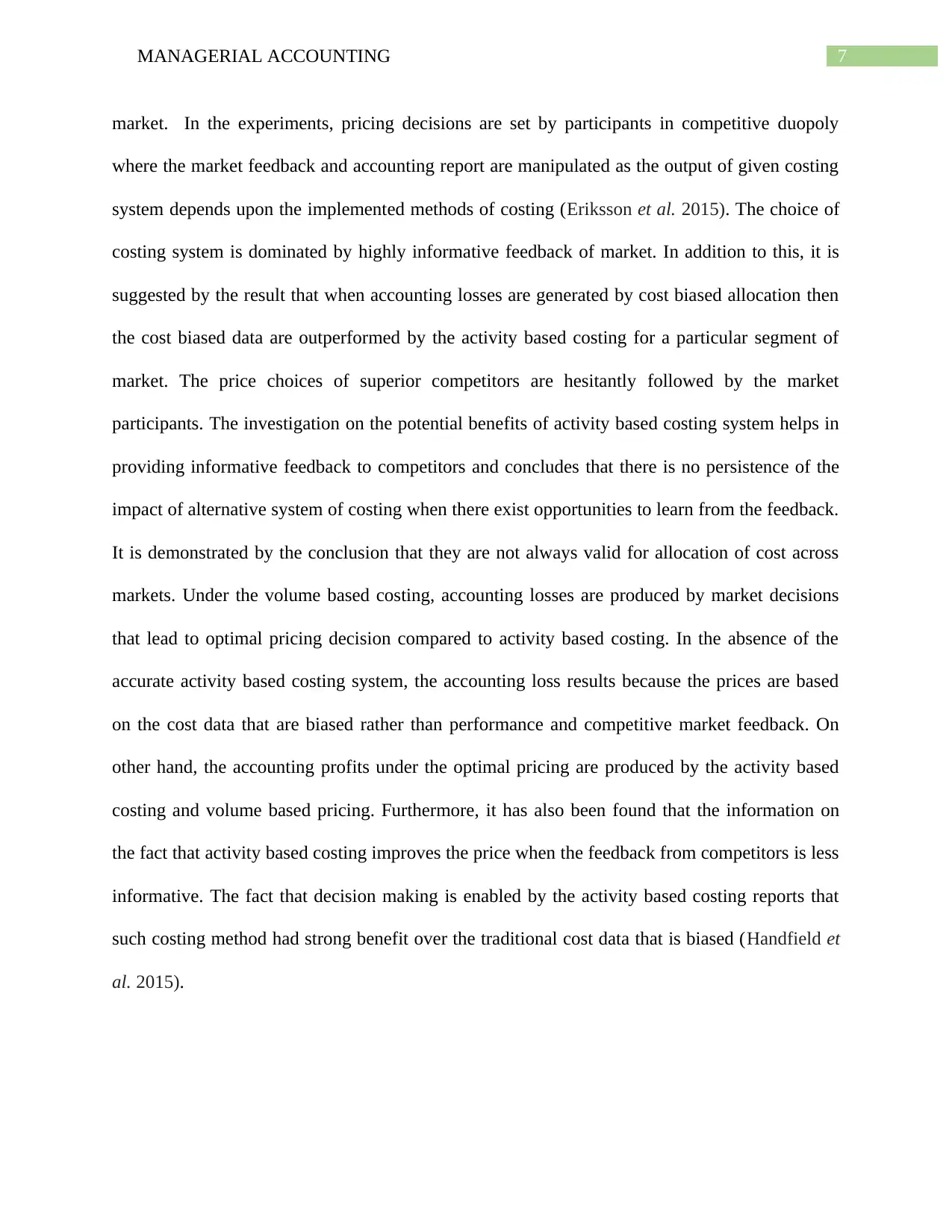
7MANAGERIAL ACCOUNTING
market. In the experiments, pricing decisions are set by participants in competitive duopoly
where the market feedback and accounting report are manipulated as the output of given costing
system depends upon the implemented methods of costing (Eriksson et al. 2015). The choice of
costing system is dominated by highly informative feedback of market. In addition to this, it is
suggested by the result that when accounting losses are generated by cost biased allocation then
the cost biased data are outperformed by the activity based costing for a particular segment of
market. The price choices of superior competitors are hesitantly followed by the market
participants. The investigation on the potential benefits of activity based costing system helps in
providing informative feedback to competitors and concludes that there is no persistence of the
impact of alternative system of costing when there exist opportunities to learn from the feedback.
It is demonstrated by the conclusion that they are not always valid for allocation of cost across
markets. Under the volume based costing, accounting losses are produced by market decisions
that lead to optimal pricing decision compared to activity based costing. In the absence of the
accurate activity based costing system, the accounting loss results because the prices are based
on the cost data that are biased rather than performance and competitive market feedback. On
other hand, the accounting profits under the optimal pricing are produced by the activity based
costing and volume based pricing. Furthermore, it has also been found that the information on
the fact that activity based costing improves the price when the feedback from competitors is less
informative. The fact that decision making is enabled by the activity based costing reports that
such costing method had strong benefit over the traditional cost data that is biased (Handfield et
al. 2015).
market. In the experiments, pricing decisions are set by participants in competitive duopoly
where the market feedback and accounting report are manipulated as the output of given costing
system depends upon the implemented methods of costing (Eriksson et al. 2015). The choice of
costing system is dominated by highly informative feedback of market. In addition to this, it is
suggested by the result that when accounting losses are generated by cost biased allocation then
the cost biased data are outperformed by the activity based costing for a particular segment of
market. The price choices of superior competitors are hesitantly followed by the market
participants. The investigation on the potential benefits of activity based costing system helps in
providing informative feedback to competitors and concludes that there is no persistence of the
impact of alternative system of costing when there exist opportunities to learn from the feedback.
It is demonstrated by the conclusion that they are not always valid for allocation of cost across
markets. Under the volume based costing, accounting losses are produced by market decisions
that lead to optimal pricing decision compared to activity based costing. In the absence of the
accurate activity based costing system, the accounting loss results because the prices are based
on the cost data that are biased rather than performance and competitive market feedback. On
other hand, the accounting profits under the optimal pricing are produced by the activity based
costing and volume based pricing. Furthermore, it has also been found that the information on
the fact that activity based costing improves the price when the feedback from competitors is less
informative. The fact that decision making is enabled by the activity based costing reports that
such costing method had strong benefit over the traditional cost data that is biased (Handfield et
al. 2015).
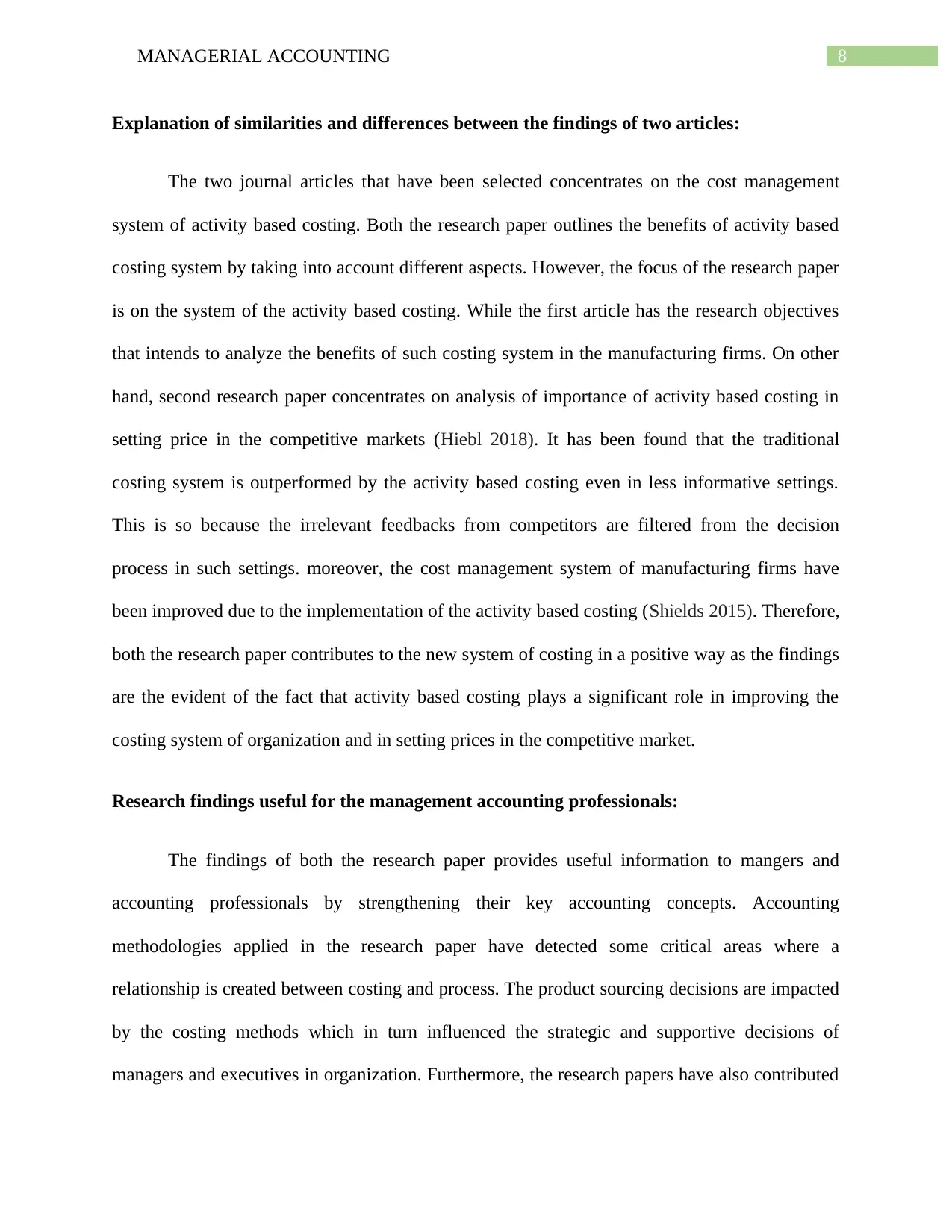
8MANAGERIAL ACCOUNTING
Explanation of similarities and differences between the findings of two articles:
The two journal articles that have been selected concentrates on the cost management
system of activity based costing. Both the research paper outlines the benefits of activity based
costing system by taking into account different aspects. However, the focus of the research paper
is on the system of the activity based costing. While the first article has the research objectives
that intends to analyze the benefits of such costing system in the manufacturing firms. On other
hand, second research paper concentrates on analysis of importance of activity based costing in
setting price in the competitive markets (Hiebl 2018). It has been found that the traditional
costing system is outperformed by the activity based costing even in less informative settings.
This is so because the irrelevant feedbacks from competitors are filtered from the decision
process in such settings. moreover, the cost management system of manufacturing firms have
been improved due to the implementation of the activity based costing (Shields 2015). Therefore,
both the research paper contributes to the new system of costing in a positive way as the findings
are the evident of the fact that activity based costing plays a significant role in improving the
costing system of organization and in setting prices in the competitive market.
Research findings useful for the management accounting professionals:
The findings of both the research paper provides useful information to mangers and
accounting professionals by strengthening their key accounting concepts. Accounting
methodologies applied in the research paper have detected some critical areas where a
relationship is created between costing and process. The product sourcing decisions are impacted
by the costing methods which in turn influenced the strategic and supportive decisions of
managers and executives in organization. Furthermore, the research papers have also contributed
Explanation of similarities and differences between the findings of two articles:
The two journal articles that have been selected concentrates on the cost management
system of activity based costing. Both the research paper outlines the benefits of activity based
costing system by taking into account different aspects. However, the focus of the research paper
is on the system of the activity based costing. While the first article has the research objectives
that intends to analyze the benefits of such costing system in the manufacturing firms. On other
hand, second research paper concentrates on analysis of importance of activity based costing in
setting price in the competitive markets (Hiebl 2018). It has been found that the traditional
costing system is outperformed by the activity based costing even in less informative settings.
This is so because the irrelevant feedbacks from competitors are filtered from the decision
process in such settings. moreover, the cost management system of manufacturing firms have
been improved due to the implementation of the activity based costing (Shields 2015). Therefore,
both the research paper contributes to the new system of costing in a positive way as the findings
are the evident of the fact that activity based costing plays a significant role in improving the
costing system of organization and in setting prices in the competitive market.
Research findings useful for the management accounting professionals:
The findings of both the research paper provides useful information to mangers and
accounting professionals by strengthening their key accounting concepts. Accounting
methodologies applied in the research paper have detected some critical areas where a
relationship is created between costing and process. The product sourcing decisions are impacted
by the costing methods which in turn influenced the strategic and supportive decisions of
managers and executives in organization. Furthermore, the research papers have also contributed
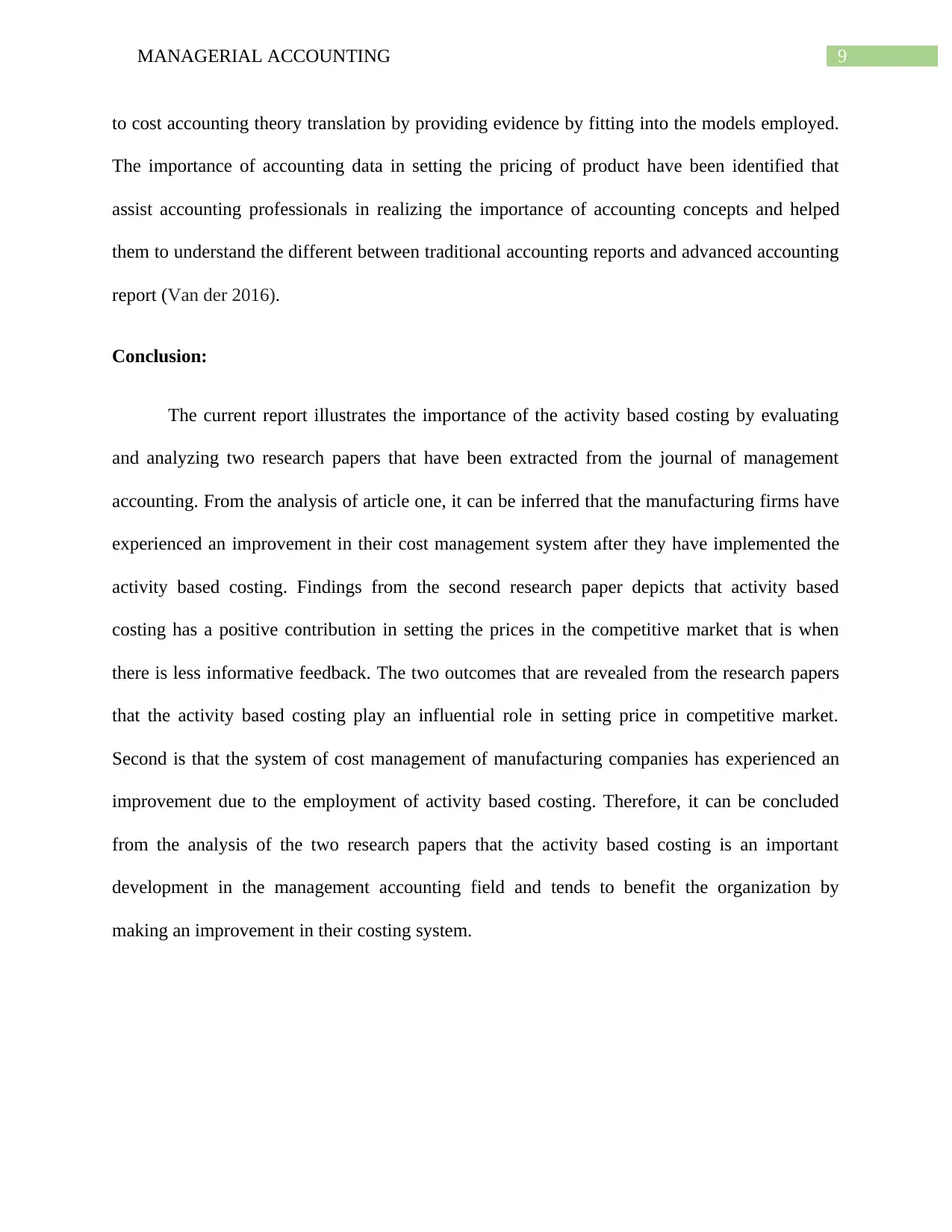
9MANAGERIAL ACCOUNTING
to cost accounting theory translation by providing evidence by fitting into the models employed.
The importance of accounting data in setting the pricing of product have been identified that
assist accounting professionals in realizing the importance of accounting concepts and helped
them to understand the different between traditional accounting reports and advanced accounting
report (Van der 2016).
Conclusion:
The current report illustrates the importance of the activity based costing by evaluating
and analyzing two research papers that have been extracted from the journal of management
accounting. From the analysis of article one, it can be inferred that the manufacturing firms have
experienced an improvement in their cost management system after they have implemented the
activity based costing. Findings from the second research paper depicts that activity based
costing has a positive contribution in setting the prices in the competitive market that is when
there is less informative feedback. The two outcomes that are revealed from the research papers
that the activity based costing play an influential role in setting price in competitive market.
Second is that the system of cost management of manufacturing companies has experienced an
improvement due to the employment of activity based costing. Therefore, it can be concluded
from the analysis of the two research papers that the activity based costing is an important
development in the management accounting field and tends to benefit the organization by
making an improvement in their costing system.
to cost accounting theory translation by providing evidence by fitting into the models employed.
The importance of accounting data in setting the pricing of product have been identified that
assist accounting professionals in realizing the importance of accounting concepts and helped
them to understand the different between traditional accounting reports and advanced accounting
report (Van der 2016).
Conclusion:
The current report illustrates the importance of the activity based costing by evaluating
and analyzing two research papers that have been extracted from the journal of management
accounting. From the analysis of article one, it can be inferred that the manufacturing firms have
experienced an improvement in their cost management system after they have implemented the
activity based costing. Findings from the second research paper depicts that activity based
costing has a positive contribution in setting the prices in the competitive market that is when
there is less informative feedback. The two outcomes that are revealed from the research papers
that the activity based costing play an influential role in setting price in competitive market.
Second is that the system of cost management of manufacturing companies has experienced an
improvement due to the employment of activity based costing. Therefore, it can be concluded
from the analysis of the two research papers that the activity based costing is an important
development in the management accounting field and tends to benefit the organization by
making an improvement in their costing system.
Secure Best Marks with AI Grader
Need help grading? Try our AI Grader for instant feedback on your assignments.
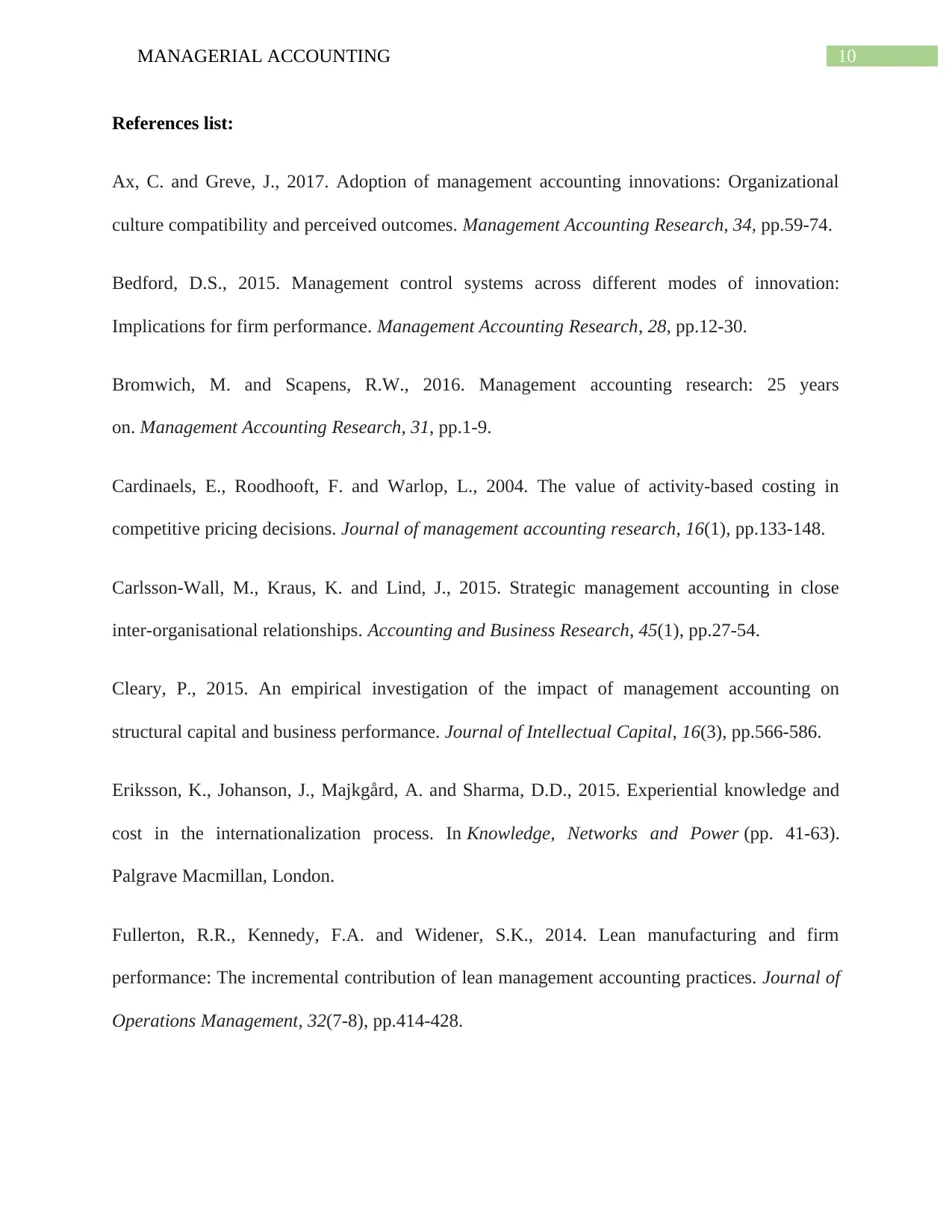
10MANAGERIAL ACCOUNTING
References list:
Ax, C. and Greve, J., 2017. Adoption of management accounting innovations: Organizational
culture compatibility and perceived outcomes. Management Accounting Research, 34, pp.59-74.
Bedford, D.S., 2015. Management control systems across different modes of innovation:
Implications for firm performance. Management Accounting Research, 28, pp.12-30.
Bromwich, M. and Scapens, R.W., 2016. Management accounting research: 25 years
on. Management Accounting Research, 31, pp.1-9.
Cardinaels, E., Roodhooft, F. and Warlop, L., 2004. The value of activity-based costing in
competitive pricing decisions. Journal of management accounting research, 16(1), pp.133-148.
Carlsson-Wall, M., Kraus, K. and Lind, J., 2015. Strategic management accounting in close
inter-organisational relationships. Accounting and Business Research, 45(1), pp.27-54.
Cleary, P., 2015. An empirical investigation of the impact of management accounting on
structural capital and business performance. Journal of Intellectual Capital, 16(3), pp.566-586.
Eriksson, K., Johanson, J., Majkgård, A. and Sharma, D.D., 2015. Experiential knowledge and
cost in the internationalization process. In Knowledge, Networks and Power (pp. 41-63).
Palgrave Macmillan, London.
Fullerton, R.R., Kennedy, F.A. and Widener, S.K., 2014. Lean manufacturing and firm
performance: The incremental contribution of lean management accounting practices. Journal of
Operations Management, 32(7-8), pp.414-428.
References list:
Ax, C. and Greve, J., 2017. Adoption of management accounting innovations: Organizational
culture compatibility and perceived outcomes. Management Accounting Research, 34, pp.59-74.
Bedford, D.S., 2015. Management control systems across different modes of innovation:
Implications for firm performance. Management Accounting Research, 28, pp.12-30.
Bromwich, M. and Scapens, R.W., 2016. Management accounting research: 25 years
on. Management Accounting Research, 31, pp.1-9.
Cardinaels, E., Roodhooft, F. and Warlop, L., 2004. The value of activity-based costing in
competitive pricing decisions. Journal of management accounting research, 16(1), pp.133-148.
Carlsson-Wall, M., Kraus, K. and Lind, J., 2015. Strategic management accounting in close
inter-organisational relationships. Accounting and Business Research, 45(1), pp.27-54.
Cleary, P., 2015. An empirical investigation of the impact of management accounting on
structural capital and business performance. Journal of Intellectual Capital, 16(3), pp.566-586.
Eriksson, K., Johanson, J., Majkgård, A. and Sharma, D.D., 2015. Experiential knowledge and
cost in the internationalization process. In Knowledge, Networks and Power (pp. 41-63).
Palgrave Macmillan, London.
Fullerton, R.R., Kennedy, F.A. and Widener, S.K., 2014. Lean manufacturing and firm
performance: The incremental contribution of lean management accounting practices. Journal of
Operations Management, 32(7-8), pp.414-428.
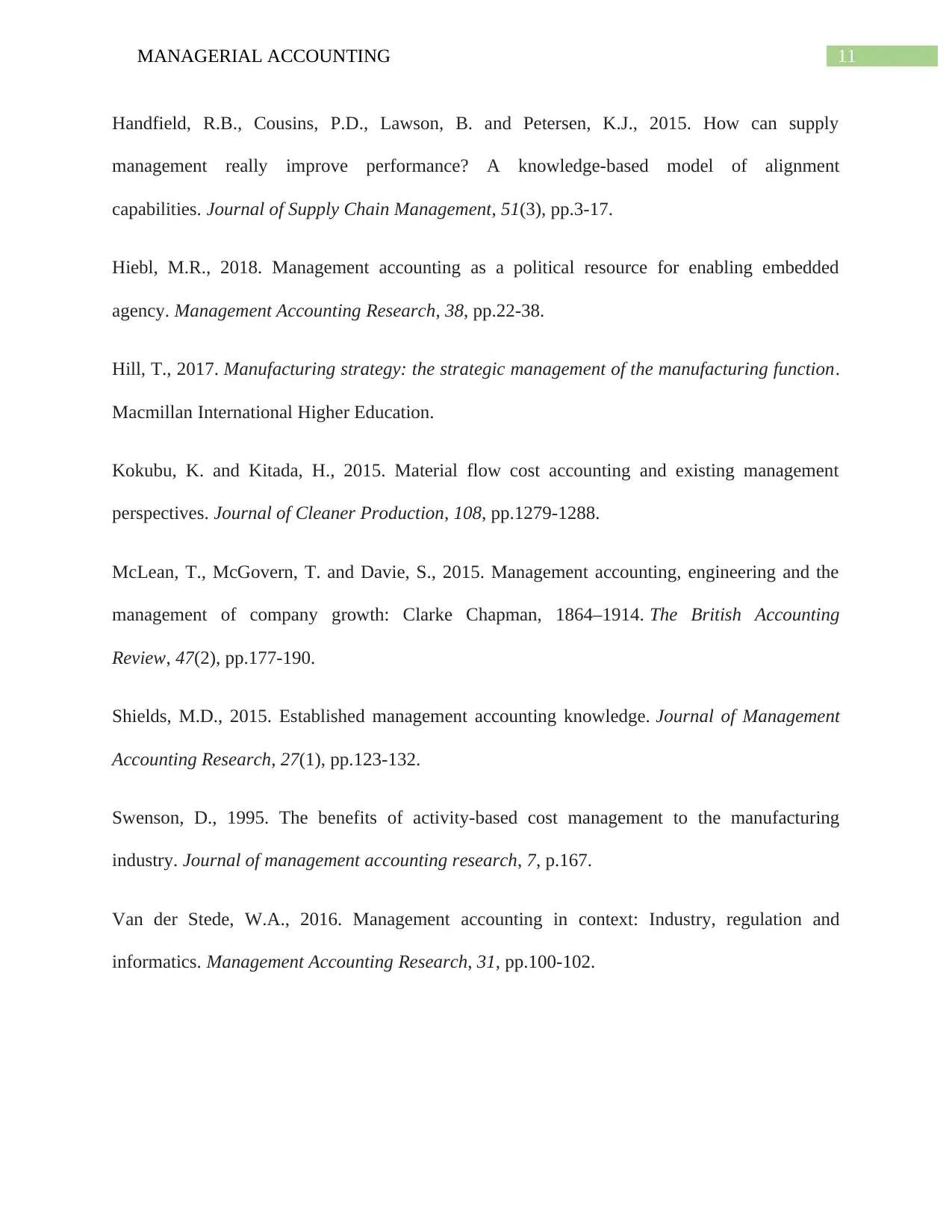
11MANAGERIAL ACCOUNTING
Handfield, R.B., Cousins, P.D., Lawson, B. and Petersen, K.J., 2015. How can supply
management really improve performance? A knowledge‐based model of alignment
capabilities. Journal of Supply Chain Management, 51(3), pp.3-17.
Hiebl, M.R., 2018. Management accounting as a political resource for enabling embedded
agency. Management Accounting Research, 38, pp.22-38.
Hill, T., 2017. Manufacturing strategy: the strategic management of the manufacturing function.
Macmillan International Higher Education.
Kokubu, K. and Kitada, H., 2015. Material flow cost accounting and existing management
perspectives. Journal of Cleaner Production, 108, pp.1279-1288.
McLean, T., McGovern, T. and Davie, S., 2015. Management accounting, engineering and the
management of company growth: Clarke Chapman, 1864–1914. The British Accounting
Review, 47(2), pp.177-190.
Shields, M.D., 2015. Established management accounting knowledge. Journal of Management
Accounting Research, 27(1), pp.123-132.
Swenson, D., 1995. The benefits of activity-based cost management to the manufacturing
industry. Journal of management accounting research, 7, p.167.
Van der Stede, W.A., 2016. Management accounting in context: Industry, regulation and
informatics. Management Accounting Research, 31, pp.100-102.
Handfield, R.B., Cousins, P.D., Lawson, B. and Petersen, K.J., 2015. How can supply
management really improve performance? A knowledge‐based model of alignment
capabilities. Journal of Supply Chain Management, 51(3), pp.3-17.
Hiebl, M.R., 2018. Management accounting as a political resource for enabling embedded
agency. Management Accounting Research, 38, pp.22-38.
Hill, T., 2017. Manufacturing strategy: the strategic management of the manufacturing function.
Macmillan International Higher Education.
Kokubu, K. and Kitada, H., 2015. Material flow cost accounting and existing management
perspectives. Journal of Cleaner Production, 108, pp.1279-1288.
McLean, T., McGovern, T. and Davie, S., 2015. Management accounting, engineering and the
management of company growth: Clarke Chapman, 1864–1914. The British Accounting
Review, 47(2), pp.177-190.
Shields, M.D., 2015. Established management accounting knowledge. Journal of Management
Accounting Research, 27(1), pp.123-132.
Swenson, D., 1995. The benefits of activity-based cost management to the manufacturing
industry. Journal of management accounting research, 7, p.167.
Van der Stede, W.A., 2016. Management accounting in context: Industry, regulation and
informatics. Management Accounting Research, 31, pp.100-102.
1 out of 12
Related Documents
Your All-in-One AI-Powered Toolkit for Academic Success.
+13062052269
info@desklib.com
Available 24*7 on WhatsApp / Email
![[object Object]](/_next/static/media/star-bottom.7253800d.svg)
Unlock your academic potential
© 2024 | Zucol Services PVT LTD | All rights reserved.



